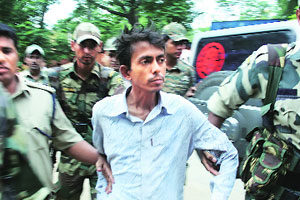His friends would call him ‘onker jadukar’ (mathematics magician) at Narendrapur Ramakrishna Mission school. His parents realised during his years at Barasat Government School that their son was a bookworm dedicated to reading books not only from the syllabus but also from outside it.
Days would turn into nights and nights fade away into daylight while their son spent his time reading. His journey took him from Barasat Government School to Ramkrishna Mission at Narendrapur from where he cleared the state higher secondary examination to qualify for the Indian Institute of Technology (IIT) at Kharagpur.
After studying there for two years, he suddenly went missing. That was in 1998. From his childhood to teenage to young adulthood – his relationship with books has always remained intact. He is Maoist leader Arnab Dam, also known as Bikram. On Friday, he created history by clearing the State Level Eligibility Test (SLET) from jail.
His parents are delighted with the news of their son clearing the examination. His father SK Dam said that his son has remained brilliant in academics right from childhood. It is a show of his true mettle that he was able to clear SLET in spite of the difficult circumstances he had to overcome in jail, stated his father – a retired judge. His son wanted to become an engineer right from his childhood and that took him to IIT Kharagpur, he added.
The police arrested Maoist leader Arnab Dam alias Bikram in 2012 from Asansol. The young leader has remained in prison since then. Recently, he has been shifted from Presidency Jail to a correctional home in Hooghly district.
Sitting in the Presidency Jail, the IIT dropout completed his graduation, post-graduation and has now cleared SLET.
Speaking on the development, state human rights activist Ranjit Sur stated that there is no other case like this. Arnab had also prepared to take the National Eligibility Test (NET) conducted by the University Grants Commission (UGC). Complaints have however emerged that in spite of turning up for the exams, he was not allowed to take it due to negligence on part of the jail authorities. He had returned to the jail and started fasting in protest.
Minister for correctional administration in West Bengal – Ujjal Biswas had stepped in at this stage to ask him to break his fast. He had also asked Arnab to contact him once he completed writing the synopsis for his research project promising to help him finish his PhD.
Human rights activist Ranjit Sur reports that what turned out was the exact opposite. Arnab was transferred from the Presidency Jail to the correction centre in Hooghly immediately after the minister’s promise – a new environment where it was difficult to survive let alone pursue his education, according to Ranjit Sur of Association for Protection of Democratic Rights (APDR).
The matter does not end here. During his stay at the Presidency Jail, Arnab helped the other inmates with their education. He would earn 80 rupees daily for his services which he used to clear the fees of his lawyers and run his case.
Such opportunities have been shut down since his move to the correction centre in Hooghly. Recently upon being presented at the Midnapore court, Arnab asked his lawyer to not ask any questions. Noting that he no longer had any income to be able to afford a lawyer, Arnab stated that his changed circumstances at the Hooghly correction centre had forced him to represent himself on his own in court.
APDR has further alleged that Arnab Dam is not being treated as a political prisoner at Hooghly in spite of clear-cut court instructions.
Ranjit Sur has requested the state government for the immediate release of Arnab Dam. There are altogether 31 cases registered against him. In the last eight years, he has been granted bail in 30 of them barring the Silda camp attack case. Human rights organisations have been pleading that he be set free by the courts for pursuing higher education.
In the past, Arnab has also had to compromise when it came to the selection of his subject of research. He was forced to choose his subject in a manner that it could be pursued from the confines of the jail. That has however not stalled his progress and the story of his struggle to overcome odds to pursue knowledge will inspire others to do the same, feel his friends.


Comments are closed.